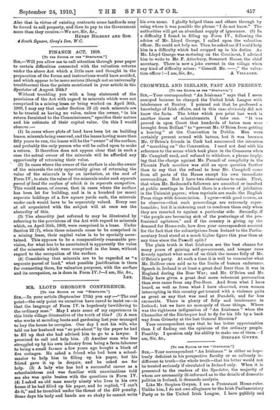MR. LLOYD GEORGE'S CONFERENCE. [To THE EDITOR Or THE "SPECTATOR. " ]
SIR,—In your article (September 17th) you say The real point—the only point we ourselves have eared to insist on—is that the language of Form IV. is hopelessly bewildering to the ordinary man." May I state some of my experiences in this little village illustrative of the truth of this ? (1) A man who works at mending boots and gardening last year managed to buy the house he occupies. One day I met his wife, who told me her husband was "so put-about" by the paper he had to fill up that she had advised him to go to a lawyer. I promised to call and help him. (2) Another man who has struggled up by his own industry from being a farm-labourer to being a. small farmer a few years ago bought a block of five cottages. He asked a friend who had been a school- master to help him in filling up his paper, but his friend gave it up in despair, and he asked me for help. (3) A lady who has had a successful career as a schoolmistress and was familiar with examinations told me she was quite beaten with the questions in Form IV. (4) I asked an old man nearly ninety who lives in his own house if he had filled up his paper, and he replied, "I can't do it," and he trembled under the threat of the £50 penalty. Some days his body and hands are so shaky he cannot write his own name. I gladly helped these and others through by using where it was possible the phrase " I do not know." The authorities will get an abundant supply of ignorance. (5) In a difficulty I found in filling up Form IV., following the advice of Mr. Lloyd George, I called upon the valuation officer. He could not help me. Then he asked me if I could help him in a difficulty which had cropped up in his duties. As Mr. Lloyd George was motoring on the Continent, I advised him to write to Mr. F. Atterbury, Somerset House, the chief secretary. There is now a joke current in the village when any kind of difficulty arises " Consult Mr. —," the valua-










































 Previous page
Previous page